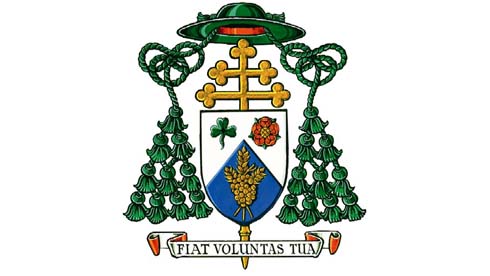Homily
[1Kings 17:10-16; Psalm 146; Hebrews 9:24-28; Mark 12:38-44]
On Friday, I held my first meeting of what we are calling the Archbishop’s Student Advisory Council. It is comprised of twenty grade eleven and twelve students from all ten school divisions operating in the Archdiocese. The encounter with these very articulate young people provides me with the opportunity to hear directly from them about their life of faith, particularly as lived out in our Catholic schools, and discuss how I, and the Archdiocese, can best accompany them along their journey with the Lord in his Church.
Present at the gathering was one of our younger priests. After discussing follow up to the meeting, he said to the students: “I will soon send you a QR code that will open to Linktree.” Now, up to that point I had been reasonably certain we were all speaking English. Yet here, some strange new vocabulary was introduced. My perplexity deepened when a student then asked, “Could we set up a portal that would …”, and I really didn’t get the rest of the sentence. Clearly, as my journey with our young people unfolds, I will need to learn a vocabulary that, to this technologically out-of-date brain, is incomprehensible.
This weekend, we are all focused upon a vocabulary, on one word, in fact, that has certainly become incomprehensible to many, yet which, for humanity’s journey together, must be both understood and practiced. Moreover, it is a term that is foundational to our Christian lives. That word is “sacrifice”. It is at the forefront of our minds as we recall on Remembrance Day the sacrifice – the ultimate sacrifice – made by men and women who gave their lives in service to our country.
To make a sacrifice is to give up something of value for the sake of a greater good. Such a concept is incomprehensible within a worldview that places the Self and its desires at the centre of all consideration. Rather than give up anything, I should hold on tenaciously to all that I have in the name of an ever-expanding self-aggrandizement. Christian faith challenges that mindset, and directs us to make sacrifice, not selfishness, the very centre of our daily living.
Consider the teaching of Jesus in the Gospel text. He pointedly states that the meagre gift of the poor widow is greater than the vast amounts placed by the rich in the Temple treasury. Here Jesus highlights the essence of authentic sacrifice: self-gift that holds nothing back, made with deep trust in the providence and wisdom of God. Jesus himself became its perfect exemplar when he gave his life on the Cross, the ultimate sacrifice that changed world history, made in trusting obedience to his heavenly Father and out of love for the world. As his followers, we are to do the same by embracing this cross of sacrifice daily. True Christian life bears the mark of ready and joyful self-gift.
In my discussion with the students, the vocabulary that was so incomprehensible to me was natural to them. They had absorbed the concepts and moulded them easily and naturally into their daily interactions with one another. In a similar way, ‘sacrifice”, though it has become to many in our day something difficult to understand, is actually natural to the human condition. We live naturally, as God intends us to do, when we allow the idea and practice of sacrifice to inform and shape our common life together.
Sacrifice is natural to us, first of all, in virtue of the fact that we have been created in the image and likeness of God. In the gift of His Son for the life of the world, God has revealed Himself to be Love that expresses itself as gift, that pours itself out for the sake of the other. Created in the image of God, then, we are most naturally ourselves when we make of our lives a gift for other people.
We see this exemplified in the many ways people automatically and instinctively make sacrifice to come to the aid of others. Of course, on Remembrance Day, we are all recalling with deep gratitude those who sacrificed their lives to defend our imperilled freedom. Recently, I visited fire-ravaged Jasper and saw first-hand how people continue to help those who lost everything by sacrificing, making gifts, of clothing and other items. I think, too, of parents who daily make deep personal sacrifices for the good of their children. In many other instances too numerous to recall here, people are sacrificing themselves to help others without giving it a second thought. Sacrifice is natural to the human condition created by God. By it we live authentically and peacefully. Selfishness is unnatural; it leads to a false and joyless way of living.
We now turn to the Eucharist, where the sacrifice Christ made on the Cross is rendered sacramentally present in our midst. May the grace of communion with our Lord in his very self-gift empower us to make of our lives a continual sacrifice for others. May “sacrifice” never become for us a foreign, incomprehensible concept, but remain always the natural expression of our life in Jesus Christ.
Most Reverend Richard W. Smith
Saint Joseph Basilica
November 10th, 2024

